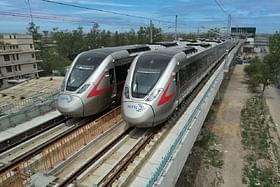In order to overcome the challenges associated with reliance solely on passenger fares, NCRTC is also actively exploring non-fare box revenue options.
The options include panel advertising, experiential advertising, retail shops, semi-naming rights, real estate development, consultancy, and other similar avenues.
Ahead of commissioning of priority section in the Delhi-Ghaziabad-Meerut Regional Rapid Transit System (RRTS), NCRTC is exploring branding and advertising opportunities in the corridor.
India’s first regional train, RAPIDX, is ready and will be commissioned for the public on the 17-km-long priority section in July, as the mandatory safety clearance have been obtained from the Commissioner for Metro Rail Safety (CMRS).
This priority section has five stations — Sahibabad, Ghaziabad, Guldhar, Duhai and Duhai Depot. Preparatory works in all these stations have been completed and are ready for operations.
In order to overcome the challenges associated with reliance solely on passenger fares, National Capital Region Transport Corporation (NCRTC) is also actively exploring non-fare box revenue options for financial sustainability.
“Talks are on with a few agencies for branding and advertising at various forms including stations, tickets. Commercial exploitation of areas around the stations are also being explored,” according to the NCRTC.
Non-Fare box revenue options being considered by NCRTC include panel advertising, experiential advertising, retail shops, semi-naming rights, real estate development, consultancy, and other similar avenues.
The first opportunity that NCRTC proposed to partner with, is the semi-naming rights of the stations. NCRTC stations will be hubs of activities with a dedicated footfall. The stations are typically at a distance of 4-5 km, thus serving a larger area.
RAPIDX stations are integrated with other modes of transport and offer several engagement opportunities for commuters and residents. By associating its name with the station, the brand will instantly create a unique recall.
Besides this, NCRTC will be selecting partners for advertising — outdoor, indoor and train wrapping, for mobile towers and optical fibre leasing and for providing last-mile connectivity.
One of the new offerings from NCRTC includes virtual stores — which will allow users to virtually select the objects. The users can shop at their origin and goods can be delivered to them at the destination station. This could be faster than other modes of e-commerce. While these virtual stores are popular in South Korea, the initiative would be the first of its kind in India.
Similarly, NCRTC can also offer brands exclusive rights to sell products of a certain category at their stations. For example, a food or grocery delivery tie-up could be with one aggregator, giving them an exclusive right to offer their products at NCRTC stations.
This is similar to the concept of “Pouring Rights” at the Airport where a single brand is given the right for offering beverages.
Selected partners may be engaged for short-term to long-term association with NCRTC, leveraging the branding potential of RAPIDX. This association will translate into increased non-fare box revenue for NCRTC and heightened visibility for partner brands, establishing a mutually beneficial partnership.
While NCRTC is gearing up for operations, construction on the corridor ahead of the priority section is also progressing at pace. About a 42-kilometre viaduct from Sahibabad to Meerut South Station has been completed.
About 25-kilometre-long section after Duhai Depot, comprising four stations, Muradnagar, Modi Nagar South, Modi Nagar North and Meerut South will be the next section to be commissioned.
On this section, from the Duhai-based Eastern Peripheral Expressway (EPE) to Meerut South RAPIDX station, about 50 per cent track laying work along with about 80 per cent OHE mast erection and about 45 per cent cantilever erection has been completed to date.
The construction of the stations in this section is also progressing at pace. The concourse and platform level of Murad Nagar station has been completed and finishing work is underway.
Keeping in view the convenience of the passengers, entry-exit gates in this station are being constructed on both sides of the road, the construction of which is progressing rapidly.
Also, the installation of four lifts and six escalators is proposed, along with stairs, to ensure smooth travel from one level to another, out of which installation of two escalators has been completed and installation of lift frames is being carried out.
The construction work of both, Modi Nagar South and Modi Nagar North stations is also progressing rapidly. Both, the concourse and platform level of Modi Nagar South station have been completed and at present, finishing work is being carried out.
Apart from this, the installation of two escalators has also been completed and installation of lift will commence soon. On the other hand, track laying work has begun at Modi Nagar North station.
At the Meerut South station, the slab casting of the mezzanine and concourse level has been completed and slab casting of the platform level is in the final stages.
NCRTC’s unique value proposition, based on RAPIDX’s distinction as the fastest regional commuter system in the country and its commitment to progress through speed, offers compelling benefits to potential partners.
CMRS has approved the operation of RAPIDX service on the priority section of Delhi-Meerut RRTS corridor. Earlier last week, Ministry of Railways had sanctioned RRTS rolling stock, which has a design speed of 180 kmph and an operational speed of 160 kmph.
With these approvals, priority section of RRTS has become the first railway system in the country which is being opened for operations, in its entire length, at maximum operational speed of 160 kmph.
Over the course of last one year, more than one Independent Safety Assessors have rigorously examined the processes deployed by NCRTC for implementing this state-of-the-art, world-class, new-age transit infrastructure project.
Thus, the system has been thoroughly scrutinised, received clearances, and received approvals from Ministry of Railways and CMRS.


